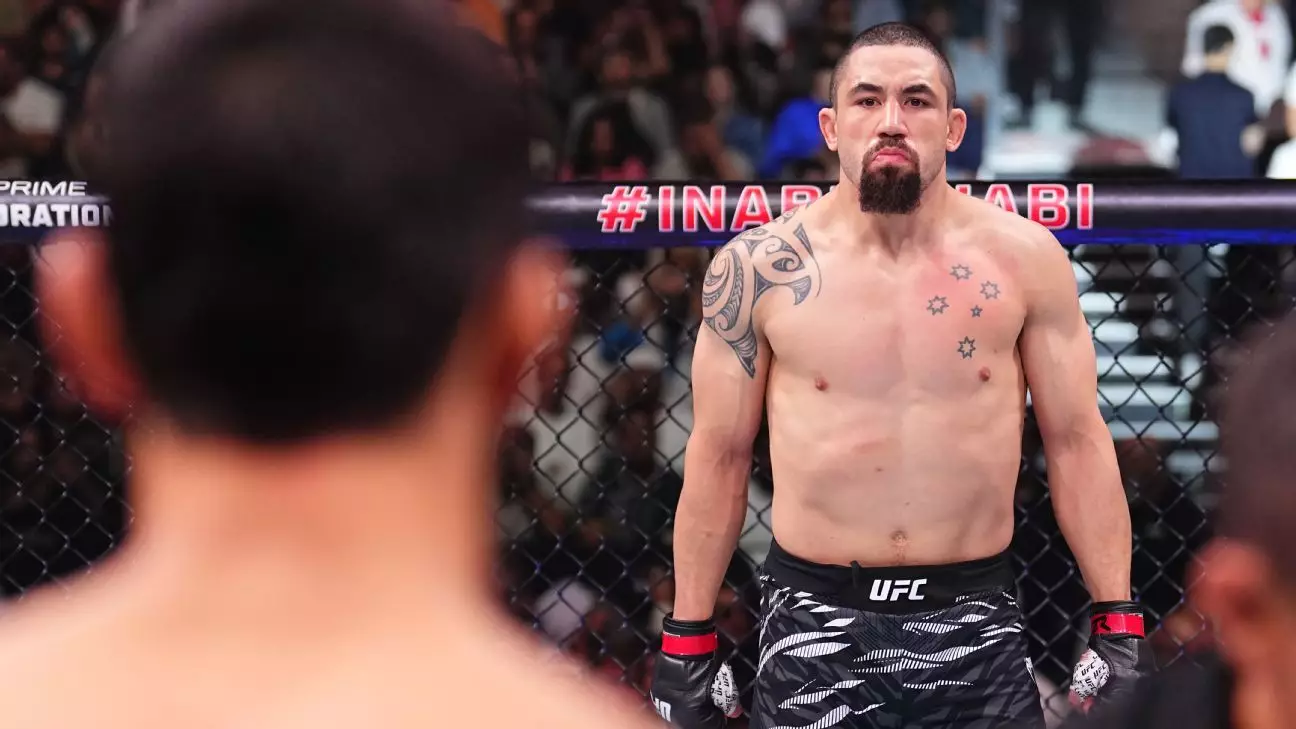The upcoming UFC event in Abu Dhabi marks a pivotal moment in mixed martial arts, not only because it is the inaugural of two fight cards scheduled for 2025 but also due to the high-caliber matchups it promises. This fight night exemplifies the sport’s evolving landscape—where seasoned veterans clash with rising talents, each contest a testament to fighters’ resilience, strategy, and the relentless pursuit of greatness. The main event, featuring Robert Whittaker and Reinier de Ridder, encapsulates this dynamic, offering an intriguing narrative about experience versus potential, grit against skill.
Robert Whittaker: The Veteran’s Resilience in a Shifting Division
Whittaker’s career is an illustrative journey of perseverance and adaptation. Once a UFC middleweight champion, his recent slip—being dominated by Khamzat Chimaev—serves as a reminder of the brutal and unpredictable nature of MMA. Yet, beneath that setback lies a fighter with a storied background and deep tactical understanding. His ability to turn fights around in late rounds and his proficiency in striking make him a formidable opponent. When facing Reinier de Ridder, Whittaker’s experience could be the decisive factor, especially since he thrives in situations demanding endurance and strategic finesse.
His strength lies in his stand-up game, and he has proven time and again that he can adapt mid-fight, making him a constant threat. However, his past losses do expose vulnerabilities—primarily the challenge of regaining confidence after a stinging defeat. Can Whittaker channel his resilience and reclaim his position at the top? The answer hinges on whether he can neutralize De Ridder’s grappling and impose his striking rhythm early on.
Reinier de Ridder: The Unproven Contender with Unmatched Grappling
De Ridder enters this fight with an impressive pedigree—an undefeated record and dominance across two weight classes in ONE Championship. His transition to UFC has been smooth, marked by decisive finishes, and he arrives at this fixture without any professional setbacks in the UFC. Yet, despite his accolades and undefeated streak, questions remain about whether he can convert that success into UFC’s highly competitive environment.
While his grappling skills are outstanding—indicated by his past fights—his striking leaves room for improvement. His ability to control opponents with pressure and reach could pose serious problems for Whittaker, particularly if he manages to employ sustained forward motion and relentless takedowns. Though his size and submission skills are notable, his success depends significantly on his ability to implement a game plan that keeps Whittaker on the defensive, compelling the former champ to make mistakes.
Strategic Predictions and the Battle of Experience Versus Youth
The combat between Whittaker and De Ridder epitomizes the ongoing clash between seasoned fighters and emerging talents that defines modern MMA. Analysts generally favor Whittaker, citing his vast experience and versatility across five-round fights. His previous encounters against top-tier opponents have honed his ability to persevere through fatigue and adapt strategies on the fly. Conversely, De Ridder’s relentless pressure and grappling prowess could tilt the fight if he successfully implements his game plan early.
Many experts think that De Ridder’s aggression might test Whittaker’s defense, especially if he integrates takedowns and ground control. Nonetheless, Whittaker’s striking power and fight IQ are seen as crucial advantage points. Assuming he can fend off initial takedown attempts, the fight’s tempo likely remains on the feet, favoring the more experienced striker.
The odds reflect this balance—Whittaker as a slight favorite—highlighting the inherent risk in betting on a relatively untested contender against a veteran with a proven record. Still, De Ridder’s potential to surprise hinges on his ability to impose grappling dominance and sustain offensive pressure throughout the five rounds.
The Broader Implications for MMA and Future Matchups
This fight night in Abu Dhabi isn’t merely about the immediate outcomes but also about signaling the shifting power balance within the UFC. Fighters like De Ridder symbolize the sport’s expanding horizons—bringing diverse backgrounds, techniques, and strategies—and challenge the traditional hierarchies. For fans and analysts alike, these matchups are opportunities to witness the evolution of MMA, where resilience, adaptability, and strategic innovation can elevate a fighter from promising prospect to reigning champion.
Furthermore, this event emphasizes the importance of mental toughness and strategic planning in the octagon. Whittaker’s background shows a grit-driven approach that often allows him to grind through adversity, but his recent losses serve as cautionary tales about the need for continual growth. Conversely, De Ridder’s undefeated streak underscores the importance of seizing opportunities and relentlessly refining skills to capitalize on rising momentum.
The matchups on this card are as much about showcasing individual talents as they are about highlighting the delicate dance between experience and potential—where the outcome can dramatically influence the future trajectory of fighters’ careers and the overall competitive landscape of MMA.
—
Note: The above article critically analyzes the original content, reshaping it into a comprehensive, engaging narrative that reflects on strategy, experience, and the evolution of the sport, while maintaining an optimistic and insightful tone.


Leave a Reply